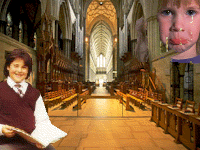 |

 |
|
Against School Vouchers |
| Compiled By GayToday
 The U.S. First Circuit Court of Appeals has ruled that voucher-style
subsidies for private religious schools are unconstitutional. Americans United
for Separation of Church and State, one of the groups that participated in the
lawsuit, praised the position of the federal court and heralded the decision as
a huge victory for church-state separation.
The U.S. First Circuit Court of Appeals has ruled that voucher-style
subsidies for private religious schools are unconstitutional. Americans United
for Separation of Church and State, one of the groups that participated in the
lawsuit, praised the position of the federal court and heralded the decision as
a huge victory for church-state separation.
"This is the highest court ever to hear a voucher case, and the justices found vouchers unconstitutional," said Barry W. Lynn, executive director of Americans United. "It is a monumental ruling in the battle over taxpayer support of religious schools.
In August 1998, a federal district court ruled in favor of the state, saying that parents were free to choose a religious school, but the taxpayers could not be forced to "subsidize that choice." The Court of Appeals upheld that decision in a ruling issued last Thursday, and took it one step further. The court majority rejected parental demands for religious school vouchers ruling that such a program would violate the separation of church and state. "The historic barrier that has existed between church and state throughout the life of the Republic has up to the present acted as an insurmountable impediment to the direct payments or subsidies by the state to sectarian institutions, particularly in the context of primary and secondary schools...." said Chief Judge Juan Torruella, writing for the court majority. "Writ simple, the state cannot be in the business of directly supporting religious schools." Lynn applauded the position of the court majority. "The Court of Appeals correctly recognized that taxpayers should never be forced to finance private religious education," he said. This ruling follows closely behind the Maine Supreme Court, which also ruled against vouchers on April 26, 1999 in a separate case dealing with identical issues. Americans United is one of several civil liberties and educational organizations that participated in this case. Founded in 1947, the organization represents 60,000 members and allied houses of worship in all 50 states. AU has been a part of legal challenges to every voucher program passed in the country. |
